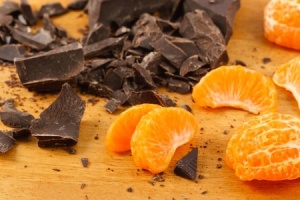8 Foods that Help Prevent Strokes
by Peter VossmanStaying healthy is easier than recovering The American Heart Association reports that “the chance of having a stroke approximately doubles for each decade of life after age 55.” That’s a sobering number, but dietary choices can improve the odds. By increasing the intake of foods that promote better circulation while reducing inflammation and blood pressure, and consuming foods high in antioxidants and beneficial nutrients, it is possible to significantly reduce the risk factor for both types of stroke—ischemic (caused by an obstruction within a blood vessel) and hemorrhagic (when a weakened blood vessel ruptures). Below are some of the best foods for stroke prevention:
The American Heart Association reports that “the chance of having a stroke approximately doubles for each decade of life after age 55.” That’s a sobering number, but dietary choices can improve the odds. By increasing the intake of foods that promote better circulation while reducing inflammation and blood pressure, and consuming foods high in antioxidants and beneficial nutrients, it is possible to significantly reduce the risk factor for both types of stroke—ischemic (caused by an obstruction within a blood vessel) and hemorrhagic (when a weakened blood vessel ruptures). Below are some of the best foods for stroke prevention:
Coffee
Here’s an early morning surprise—coffee may be useful for more than a boost of energy. A long-term study conducted in Japan found that daily coffee drinkers had a 20 percent lower incidence of stroke than those who rarely drank the beverage. Tea drinkers saw a similar risk reduction, so consider adding a cup of coffee or tea to your daily routine.
Chocolate
While dark chocolate generally gets the credit for its cardiovascular benefits, studies have shown that both dark and milk chocolate can aid in the prevention of strokes. The high concentrations of flavonoids found in chocolate possess anti-inflammatory and anti-clotting properties, and help reduce blood pressure and harmful cholesterol. And for some people, the taste alone is relaxing.
Tomatoes
While fruits and vegetables in general are helpful in combating strokes, tomatoes have the added benefit of containing lycopene, which has been linked to significant reduction in the risk of a stroke. Those who consume tomatoes regularly are nearly 60 percent less likely to suffer a stroke compared to those with little or no lycopene in their diet. Any tomato will help but a ripe, juicy heirloom will surely whet your appetite for more.
Salmon
All fresh fish are high in proteins, which fight against stroke, but salmon earns special recognition for its potent omega-3 fatty acid content. Essential fatty acids are responsible for optimal brain and heart health, but are not produced naturally by the body and need to be part of a healthy diet. Fresh fish also contains antioxidants that reduce the damage caused by free radical cell damage. There are several types of salmon, so experiment to find the one you like best.
Citrus Fruits That morning glass of juice or plate of fresh fruit? Try to include oranges, grapefruits and lemons for their high amounts of flavonoids and other antioxidants, which are powerful anti-stroke properties. The compounds found in citrus fruit also combat insulin resistance and lower levels of harmful cholesterol.
That morning glass of juice or plate of fresh fruit? Try to include oranges, grapefruits and lemons for their high amounts of flavonoids and other antioxidants, which are powerful anti-stroke properties. The compounds found in citrus fruit also combat insulin resistance and lower levels of harmful cholesterol.
Beans
Beans are a potent stroke-fighting food, containing high levels of magnesium and antioxidants to reduce oxidative stress and regulate blood pressure. Consuming just 100 milligrams of magnesium each day can reduce stroke risk by 9 percent, and beans also provide high quality fiber and protein. You’ll find many types of dried beans in the market, but even the canned variety will help.
Leafy Greens
Leafy green vegetables, such as kale, spinach and collard greens, contain magnesium and antioxidants that they body can use to lower the risk of stroke. A diet high in leafy greens contributes to less inflammation, lower cholesterol and lower blood pressure, resulting in a much lower chance of suffering a debilitating incident. A salad a day keeps the doctor away!
Whole Grains
Eating whole grains can greatly lower the risk of ischemic stroke, especially in women. Whole grain foods are rich in antioxidants, fiber and a number of beneficial vitamins and minerals. A study conducted by Harvard discovered that women who ate just two to three servings of whole grains per day reduced stroke risk by 40 percent.
While no single food is guaranteed to prevent a stroke, supplementing an existing diet with the foods above offers a scientifically proven way to put the odds in your favor. Incorporating foods from this list into your meals can improve your health, lower your risk of stroke and give you greater peace of mind.
